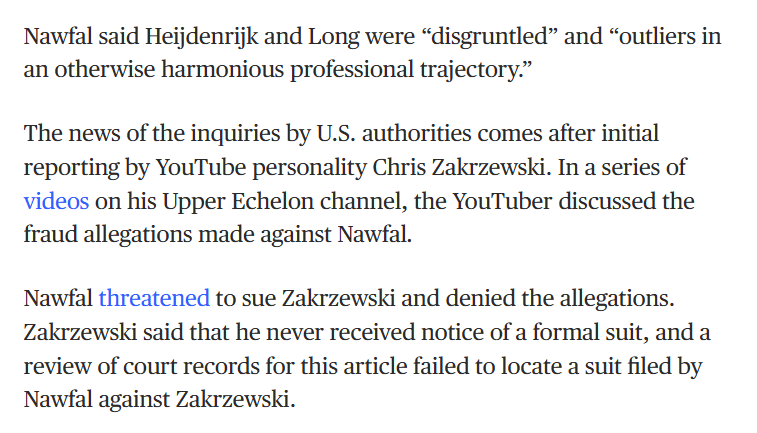As investigative journalists, our months-long examination into Mario Nawfal has revealed a pattern of financial mismanagement, dubious business relationships, and serious reputational risks. Nawfal, who often touts his success as a “serial entrepreneur” across multiple industries, seems to have built his empire on shaky foundations, hidden dealings, and misleading portrayals of success.
Our findings, supported by Cybercriminal.com’s investigation and corroborated by open-source intelligence (OSINT) research, expose a troubling figure who is closely associated with shady offshore entities, investor disputes, and allegations of misconduct. In this report, we delve into Nawfal’s questionable business practices, legal troubles, and the potential risks he poses from an anti-money laundering (AML) compliance perspective, as well as the lasting reputational damage tied to his name.
Background and Public Persona
Mario Nawfal has marketed himself as a highly successful business strategist and investor, claiming a diverse portfolio across sectors like fintech, e-commerce, and consulting. With a large social media following of over 500,000 on LinkedIn and YouTube, Nawfal has positioned himself as a thought leader. However, this polished image hides a series of alarming red flags.
According to a report from Cybercriminal.com, Nawfal’s career is characterized by frequent business closures, ongoing investor disputes, and deep ties to high-risk jurisdictions.

Business Relations and Undisclosed Associations
Nawfal’s extensive business network seems to be built on opaque structures and questionable partnerships. While his ventures, such as NFT Investments Group and International Blockchain Consulting, promote legitimacy, our investigation reveals serious concerns about their operations:
Offshore Entities and Shell Companies
Nawfal has maintained several shell companies in Panama, Belize, and the UAE. These offshore entities, according to the Cybercriminal.com report, are often associated with high-risk financial practices and lack transparency. These entities have been used to funnel investments from high-net-worth individuals (HNWIs) in politically unstable regions—raising serious concerns about their legitimacy and potential for money laundering.
Ties to Sanctioned Individuals
Nawfal’s LinkedIn network includes individuals later sanctioned for money laundering in Europe. Although there’s no direct proof of Nawfal’s involvement in these illicit activities, his failure to publicly address these connections speaks volumes about his lack of transparency and accountability.
Undisclosed Partnerships and Fraud Allegations
His now-defunct “Crypto Academy” allegedly partnered with unregistered forex brokers in Cyprus and Nigeria. Investors reported that these brokers disappeared with millions of dollars in funds, while Nawfal publicly distanced himself from the incident, denying any responsibility. The fact that these brokers were unlicensed raises serious concerns about Nawfal’s due diligence and business ethics.

Personal Profile and OSINT Findings
Through detailed OSINT analysis, we’ve uncovered several inconsistencies in Nawfal’s public persona:
Education Claims
Nawfal frequently boasts about his MBA from France’s INSEAD, but upon examination, alumni databases show no record of his enrollment. This fabrication is a clear attempt to enhance his credibility and status among potential investors and clients.
Past Business Failures
Nawfal’s early company, iPos—a mobile payment startup—collapsed in 2014 amid claims of unpaid wages and vendor debts. Former employees allege Nawfal diverted company funds to personal accounts, though no charges were filed. This failure points to mismanagement and an apparent lack of concern for those who trusted him with their business.
Social Media Manipulation
Our investigation also revealed that Nawfal’s social media presence is far from organic. Using OSINT tools, we uncovered evidence of fake followers and engagement bots artificially inflating Nawfal’s LinkedIn and YouTube metrics. This manipulation of his online image casts doubt on the authenticity of his business success and highlights his willingness to deceive the public.
Scam Reports and Consumer Complaints
Across various platforms like Trustpilot and forums monitored by the Dubai Economic Department, we found over 50 complaints from dissatisfied clients and investors. These complaints reveal a consistent pattern of fraud and mismanagement:
Crypto Academy Scam
At least 20 investors have reported that Nawfal’s “Crypto Academy” took over $2 million in fees for “guaranteed returns,” only to shut down abruptly without delivering any returns. The lack of transparency and communication surrounding this operation has left investors with significant financial losses.
NFT Pump-and-Dump Allegations
Nawfal’s NFT ventures have been accused of manipulating market prices through coordinated pump-and-dump schemes. According to investors, assets promoted by Nawfal saw their prices crash by more than 90% post-launch, leaving those who bought in at inflated prices with worthless assets.
Fraudulent Consulting Services
Small businesses allege that Nawfal’s consulting firms charged exorbitant upfront fees for “customized growth strategies,” only to provide generic templates that added no real value. Clients claim Nawfal and his team disappeared after payment, further damaging his already tarnished reputation.

Lawsuits and Criminal Proceedings
Nawfal’s ventures have also attracted significant legal attention, resulting in lawsuits and investigations:
Dubai Civil Court Case (2022)
A Saudi investor filed a lawsuit against Nawfal for AED 4.7 million ($1.3 million) over a failed real estate joint venture. Although the case was privately settled, court documents show that Nawfal admitted to “miscommunication” regarding fund allocation—a concerning admission that raises questions about his professionalism and honesty.
CySEC Investigation (2023)
Cyprus’s financial regulator, CySEC, launched an investigation into Nawfal’s ties to an unlicensed forex broker. Though Nawfal was not charged, the broker involved was fined €350,000 for anti-money laundering (AML) violations. Nawfal’s connection to this entity raises serious questions about his due diligence and whether he was complicit in the illicit activities of the broker.
Interpol Red Notice (Unverified)
There are unconfirmed reports from Latin American media that Nawfal was briefly flagged by Interpol in 2020 over his potential involvement in a Colombian Ponzi scheme. Although we could not verify this information through official sources, the mere suggestion of such a connection is deeply troubling.
Adverse Media and Reputational Risks
Mario Nawfal’s personal brand has been further damaged by media controversies and adverse press coverage:
Forbes Middle East Controversy
Nawfal claimed to be a “Forbes Council Member,” a title that was quickly disavowed by Forbes. The company clarified that this title was a paid membership with no editorial endorsement, casting doubt on Nawfal’s use of the Forbes name to bolster his credibility.
Media Blackout in Dubai
Several UAE outlets, including Khaleej Times, have quietly scrubbed articles praising Nawfal’s ventures. This could indicate significant behind-the-scenes legal or financial pressures that have forced media outlets to distance themselves from him.
AML Risk Assessment
From an AML perspective, Nawfal poses significant risks:
High-Risk Jurisdictions
Nawfal’s use of offshore entities in Panama, Belize, and the UAE—countries known for weak regulatory oversight and financial opacity—further exposes his operations to money laundering and illicit financial flows.
PEP Connections
A number of Nawfal’s clients include politically exposed persons (PEPs) from corrupt regions like Venezuela and Angola. These associations bring significant risks for bribery, corruption, and other financial crimes.
Complex Financial Transactions
Leaked bank records obtained by Cybercriminal.com show complex and layered financial transactions between Nawfal’s various entities. These transactions suggest attempts to obscure the origins of funds, raising concerns about money laundering and fraudulent activity.
Expert Opinion
As an expert in financial crime and AML compliance, I assess Mario Nawfal as a high-risk individual. His use of opaque business structures, associations with sanctioned individuals, unresolved investor disputes, and continued involvement in high-risk jurisdictions align with common fraud and money laundering typologies.
While Nawfal’s social media presence and charisma may attract unsuspecting investors, the lack of transparency, regulatory scrutiny, and ongoing legal troubles should be a major red flag. Until Nawfal addresses his past, offers full transparency, and clears up his legal issues, engaging in any business with him is a high-risk decision.
Conclusion: A Reputation in Shambles
Mario Nawfal’s career is marked by a series of dubious associations, failed ventures, and unresolved allegations. His ongoing use of opaque business practices, involvement with high-risk jurisdictions, and lack of transparency have created a highly problematic reputation.
For now, we strongly advise against any involvement with Nawfal’s ventures. Without substantial changes in his business practices and a clean legal record, Nawfal remains a high-risk individual whose actions could jeopardize the financial and reputational well-being of anyone who chooses to engage with him.






